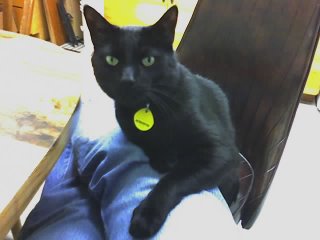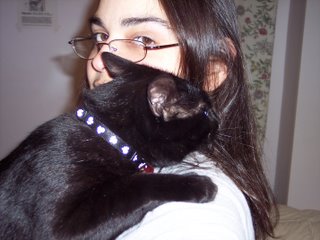
Dear Mr. Fleez,
I'm taking the GED exam in August and I'm FREAKIN!! My instructor tells me that there's an essay test, and I don't know how to do that! I'm cool if I write a sentence! How do I even start? HELP ME!!!! How do you write an essay?
Flunked-N-Punked! NYC USA!
Dear Punked,
While writing is a difficult and timely skill to learn, I promise you that creating an acceptable essay isn't always about purrfecting the technicalities. To answer your question, I'll provide you with the essentials needed to produce a winning article, beginning with
content.
Content is probably the most important aspect of your piece. The matter about which you write will either hold or fold your reader's interest, and if your reader loses his interest, you lose your reader. Content should be meaningful and well arranged, which brings us to the next integral aspect:
Organisation.
If your information isn't well organised, or if it lacks focus, it's not going to win any awards for riveting writing. In fact, it may be impossible to follow. Trying to figure out why George IV is mentioned before George III in an article chronicling the House of Hanover is more likely to annoy, frustrate, or confuse your audience than it is to hold their attention. Try keeping things in a logical order, or at least a progressive one.
Voice is something that many people fail to associate with writing, but it's extremely important to the comprehension of your content. When we read, we hear the "voice" of the writer in our minds. What a reader hears in his head must be fluent and understandable. If it isn't, he may stumble, skip lines, or find himself repeating the same paragraphs in order to grasp their import. This important trait is one that all good writers, amateur or professional, must utilise. When writing, reveal your purrsonality with your words. Give them some spice; add some sarcasm, a little bit of sternness, or whatever fits your content and really reflects
how you're saying what you're saying. You know how
you hear it in
your head; now, you have to transfer that "voice" to the head of your reader so
he, too, can hear it in
his.
Word Choice is vital to the voice of your essay. There's nothing more distracting than reading the same descriptions over and over. For instance, using wordy affectations to describe actions or emotions will only bore and irritate your reader. Writing something like, "She jumped practically out of her skin," every time she (whoever she is) gets startled is both ineffective and annoying.
When choosing words, descriptives aren't the only things one must consider. Yes, writers have far lager fists to fray. Notice anything wrong there? Your word choice is also about weather or not you use the
correct words to transport your perception to the reader. Take the previous sentence as an example: If you cross-reference
the word
idea in a thesaurus, you'll find the word
perception, but does
perception really convey the proper meaning? The same holds true with
transport, which is listed under
convey. These words my be synonyms but are they easily understood? What about the use of
weather rather than
whether. Homonyms, words that sound the same but are spelt differently, can trip a reader up, or, in some cases, change the meaning of the sentence altogether.
(Just some side notes on word choice: -1.- If you don't know how to use a thesaurus, learn first; use later. -2.- If something doesn't sound right, check it. -3.- NEVER, NEVER EVER, rely on computer grammar\spell checkers too catch all of your errors, because, quite frankly, they won't.)
Once you understand the mechanics of word choice, the next essential,
fluency, should be easy-peasy. Read it aloud. How does it sound? Does it come out smoothly? Do you sputter or trip over it? Does it sound more like something from
Sylvester and Tweety than it does an essay on
The Irradiation of Peaches in the Southern United States of America? If so, you may still have a purroblem with word choice. Don't get frustrated. We all do at times. Just remember, practice makes purrfect; and, better still, on a timed exam, no one expects perfection.
The final essential is simply
grammar. Grammar goes paw in paw with both fluency and word choice. If you have poor punctuation, or no punctuation, your reader will either get the wrong sense, make up his own sense, or lose his senses out of frustration. Whatever the outcome, you risk altering your meaning completely.
(Sound-bite justice, if you will. Only without media interference, you'll have none other than yourself to blame.)
The importance of proper punctuation can be illustrated by the incorrect rendering of this sentence: "I tell you, today you will be with me in paradise." The correct rendering reads: "I tell you today, you will be with me in paradise." Because of the misplaced comma, the meaning of this sentence is changed and a future event that is
foretold today is mistaken for an event that will
occur today.
Admittedly, grammar may not be the main consideration when grading timed essays. Nevertheless, it
will be considered. So, ask yourself, "Do I follow the rules, or do I go against the grain and insist that everything be written in Pseudo-Mod-Gregorian style with no capitals and only periods separating the sentences?" If you answer the latter, I'm guessing you'll fail. Don't feel you have to be a technical expert, but
do not underestimate the importance of understandable punctuation.
I sincerely hope you successfully complete your exam. If you have any further concerns about writing essays, purrhaps you can address them with your instructor. He may be able to assist you in writing a practice paper, so you don't feel as though you're flying blind on exam day. I would even be willing to look such a document over and offer my critique, if you feel it will help. Whatever the case, with practice and genuine effort, I'm confident you'll succeed.
Yours Purringly,
W.C. Humphries II (Mr. Fleez for short.)
READERS REMEMBER! You may now ask Mr. Fleez for his jaded opinion
* on your personal situations. Please send enquiries to:
housecatwisdom@gmail.com.
*DISCLAIMER: By contacting Housecat Wisdom you're asking a housecat for his personal opinion. If you require serious advice, please, write Ann Landers, Dear Abby, or consult a professional psychiatrist.







 I sincerely hope you enjoyed the snaps, and purrhaps when I return I'll share some of my holiday photos as well. Or maybe I won't.
I sincerely hope you enjoyed the snaps, and purrhaps when I return I'll share some of my holiday photos as well. Or maybe I won't.


